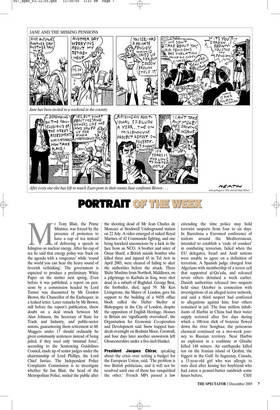PORTRAIT OF THE WEEK M r Tony Blair, the Prime Minister,
was forced by the presence of protesters to have a cup of tea instead of delivering a speech in Islington on nuclear energy. After his cup of tea he said that energy policy was ‘back on the agenda with a vengeance’ while ‘round the world you can hear the heavy sound of feverish rethinking’. The government is expected to produce a preliminary White Paper on the matter next spring. Even before it was published, a report on pensions by a commission headed by Lord Turner was discounted by Mr Gordon Brown, the Chancellor of the Exchequer, in a leaked letter. Later remarks by Mr Brown, still before the report’s publication, threw doubt on a deal struck between Mr Alan Johnson, the Secretary of State for Trade and Industry, and public-sector unions, guaranteeing them retirement at 60. Muggers under 17 should ordinarily be given community sentences instead of being jailed, if they used only ‘minimal force’, according to the Sentencing Guidelines Council, made up of senior judges under the chairmanship of Lord Phillips, the Lord Chief Justice. The Independent Police Complaints Commission is to investigate whether Sir Ian Blair, the head of the Metropolitan Police, misled the public after the shooting dead of Mr Jean Charles de Menezes at Stockwell Underground station on 22 July. A video emerged of naked Royal Marines of 42 Commando fighting, and one being knocked unconscious by a kick in the face from an NCO. A brother and sister of Omar Sharif, a British suicide bomber who killed three and injured 65 in Tel Aviv in April 2003, were cleared of failing to alert the authorities before the attack. Three Shiite Muslims from Northolt, Middlesex, on a pilgrimage to Karbala in Iraq, were shot dead in a suburb of Baghdad. George Best, the footballer, died, aged 59. Mr Ken Livingstone, the Mayor of London, gave his support to the building of a 945ft office block called the Helter Skelter at Bishopsgate in the City of London, despite the opposition of English Heritage. Houses in Britain are ‘significantly overvalued’, the Organisation for Economic Co-operation and Development said. Snow trapped hundreds overnight on Bodmin Moor, Cornwall, and four days later another snowstorm left Gloucestershire under a five-inch blanket.
President Jacques Chirac, speaking about the crisis over setting a budget for the European Union, said, ‘The problem is two British politicians, and it will not be resolved until one of them has vanquished the other.’ French MPs passed a law extending the time police may hold terrorist suspects from four to six days. In Barcelona a Euromed conference of nations around the Mediterranean, intended to establish a ‘code of conduct’ in combating terrorism, failed when the EU delegates, Israel and Arab nations were unable to agree on a definition of terrorism. A Spanish judge charged four Algerians with membership of a terror cell that supported al-Qa’eda, and released seven others detained a week earlier. Danish authorities released two suspects held since October in connection with investigations of an alleged terror network, and said a third suspect had confessed to allegations against him; four others remained in jail. The four million inhabitants of Harbin in China had their water supply restored after five days during which a 100-ton slick of benzene flowed down the river Songhua; the poisonous chemical continued on a two-week journey to Russian territory. Near Harbin an explosion in a coalmine at Qitaihe killed 148 miners. An earthquake killed ten on the Iranian island of Qeshm, the biggest in the Gulf. In Saguenay, Canada, a 15-year-old girl who was allergic to nuts died after kissing her boyfriend who had eaten a peanut-butter sandwich some hours before. CSH



























































 Previous page
Previous page